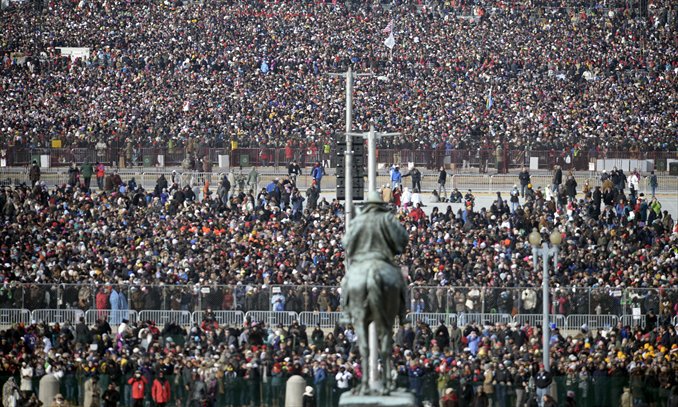Obama faces tougher term

US President Barack Obama was sworn in for his second term on Monday, cementing anther historic victory for the nation's first black president. Observers expect Washington to speed up its rebalancing to the Asia-Pacific region in the next four years, but also that it is likely to shift focus from military affairs to diplomatic and economic fronts.
The president sailed into his second term with a litany of challenges from both home and abroad ahead including lingering high unemployment, bitter political battles over budget and spending, controversies over gun control and unrests in a post-revolution Middle East.
Analysts noted that Obama's main focus in the next four years would remain fixing the economy, no easy job given the disappointing job figures posted last year.
The unemployment rate in December 2012 stood at 7.8 percent, half a percentage point higher than the figure four years ago.
"The high unemployment will take a toll on private consumption, a main driver for US economic growth. Together with the weak performance of the manufacturing sector, Obama will find it harder than he has expected to boost the economy," Chen Dongxiao, director of the Department of American Studies under the Shanghai Institute for International Studies, told the Global Times.
While domestic issues will be the top priority for the Obama administration, analysts indicated the US rebalancing strategy would continue.
"Washington will accelerate the pace in the coming years, but will see growing difficulties," commented Chen.
During Obama's first term, the US further consolidated its military presence in the Asia-Pacific region, and staged frequent drills with allies. The US will also station a 2,500-strong US Marine Air-Ground Task Force by 2016 in Darwin, Australia.
"The military rebalancing didn't take China's feelings into account, which raised mutual distrust. With the gap between China and the US narrowing, competition will intensify in the years to come," said Yuan Zheng, a researcher with the Institute of American Studies under the Chinese Academy of Social Sciences.
While flexing military muscle in the region, Washington also stirred up tensions between China and its neighbors by meddling in their territorial disputes, said Chen, noting that it has raised concerns among some countries who are reluctant to take sides between the two powers.
Kenneth Lieberthal, a senior fellow with John L. Thornton China Center at the Washington-based Brookings Institution, last week warned in a policy suggestion to Obama that the current strategy is in danger of actually enhancing rather than reducing bad security outcomes, adding that "most notably, territorial disputes have become sharper."
Lieberthal urged Obama to take the initiative this spring to solidify and strengthen the core bilateral relationship with China while continuing to provide reassurances to allies and partners of US staying power in the region.
Yuan told the Global Times that he expects the Obama administration to seek a balance in dealing with China while shifting its rebalancing focus gradually from the military to diplomacy and economy.
"The key to Sino-US relations will be the management of disputes. Obama wouldn't want to see stagnation in the all-round relationship with China due to disputes," he said.
Obama competed in China-bashing rhetoric with his challenger Mitt Romney during the election last year, though they also made friendly gestures.
Experts also noted that China shouldn't worry too much about the US pivot to Asia. "The rise to power of Islamic parties in the Middle East, Iran and Afghanistan will all distract the US," Chen said.
Commenting on Obama's second term, China's foreign ministry spokesperson Hong Lei Monday said that he hoped the two countries could continue reinforcing dialogues and exchanges, boosting mutual trust and cooperation, and making efforts to build "a new type of major power relationship."
Agencies contributed to this story
Related article: Obama has governance lesson for China